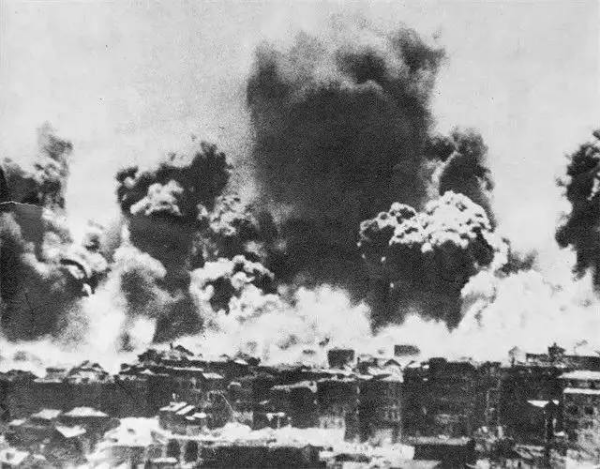Tongjunge Pharmaceutical Factory, in Southwest China’s Chongqing Municipality, is a testament to the enduring human spirit. With over 110 years of history, this long-established Chinese medicine enterprise exemplifies resilience and empathy.
During the Chinese People’s War of Resistance Against Japanese Aggression, Tongjunge experienced over 100 bombings, but never ceased its medicine supply, cementing its legacy in Chongqing’s history.
In May 1939, Chongqing was enveloped in a haze of smoke. The roar of Japanese aircraft frequently pierced the sky, and air raid sirens became the most familiar backdrop for this wartime capital.

A historic photo captures Chongqing enveloped in a haze of smoke [Photo/sasac.gov.cn]
In front of Tongjunge Pharmacy (the predecessor of the Tongjunge Pharmaceutical Factory of the Tajik Group under China National Pharmaceutical Group Co., Ltd., a centrally administered State-owned enterprise), Lan Suyong, the newly appointed manager, directed staff in moving medicinal supplies. His worried expression mirrored the collective anxiety as black smoke billowed from another burning district.
Despite the chaos, Lan was determined to ensure that Tongjunge’s medicines would not cease to supply those in need. He decided to split the staff into two teams: one led by deputy manager He Enpu to remain in the city, and the other led by himself to relocate to a hastily constructed factory in Shapingba.
In the makeshift factory at Tuanshanbao in Shapingba, Lan and a group of seasoned artisans gathered under the flickering light of kerosene lamps. They faced significant challenges: dwindling supplies and skyrocketing prices of raw materials. Yet, Lan devised a plan to produce smaller packages of medicine to reach more people.
Meanwhile, back in the city center, He and his team faced relentless bombings but continued to operate, even establishing a rescue team to aid in firefighting and first aid.
The resilience of Tongjunge was embodied by dedicated workers like Zhao, who traversed miles each day carrying boxes of medicine from Shapingba to the city center. Despite frequent air raids, the staff continued to distribute medicine to civilians, often under the threat of imminent danger.
By the end of the war in August 1945, Tongjunge had endured over 100 bombings without a single day of interrupted service. The pharmacy’s enduring presence became a symbol of hope and resilience for the people of Chongqing. When peace finally returned, and Tongjunge reopened on its original site, the community gathered to celebrate the return of a cherished institution.
Throughout those tumultuous years, the scent of Tongjunge's medicines filled Chongqing’s streets and alleys. The deep-rooted compassion and enduring perseverance of the Chinese people remained unshaken by bombs and will undoubtedly be passed down from generation to generation.
(Executive editor: Yuan Ting)